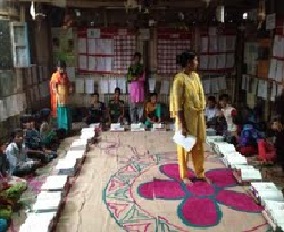Guest post by Luke Pardue. Luke is in his second year studying Economics and Philosophy at the University of Notre Dame in South Bend, Indiana, USA. He is currently completing a two-month internship in BRAC’s Social Innovation Lab.
She wanted to be an airplane pilot. Sitting with my knees bent to my chest, on the floor of a one-room BRAC primary school in Manikganj, I don’t think I could have been more surprised.
Don’t get me wrong, I have been caught off guard plenty of times since I arrived in Bangladesh. This trip is my first outside of the United States and, as much I tried to prepare myself for this new country and new culture, I knew there was only so much I could do to get ready for the experience. No pre-departure lecture about “culture shock” could warn me of the fear I would feel riding in a car on the roads of Bangladesh— a country with an apparent preference for car horns rather than substantive traffic laws. Nor could I fully prepare for the smaller things that I needed to adjust to, like learning how to get lunch at the BRAC staff canteen.
Dhaka is a city unlike any I’ve been to before. It is going through profound changes, currently transforming itself from the capital of a small developing nation to a global megacity. On my daily walk to work, I can see this transformation right before my eyes. Buildings are rising where weeks ago were simply large holes in the ground. Filled with crowded streets, Dhaka makes me feel alive — if only because one wrong step into the street could be my last! Yet there are deeper challenges to living in this new city than keeping on the sidewalks. My pale skin causes constant stares and comments, and not being able to speak Bangla means simply trying to communicate with someone at a local store a task.
When the interns took our first field visit to a village in Manikganj, right outside of Dhaka, I expected these differences to be more pronounced. What could I, a college student from the United States, have in common with the men and women who lived in the village? I have only encountered such poverty while reading about it in textbooks and news articles. How would I feel coming face to face with the people whose lives, to this point, could not be more different from mine?
One of the stops on this visit was a BRAC primary school. These schools serve young students who have dropped out or are unable to attend government schools. They are a second chance for the most disadvantaged children. Seeing this single room, in which the students sat along three walls with only some books and a chalk tablet to write on, I thought about how different my school was from this one — no computer lab, no cafeteria, no playground. How would my life have turned out if I had grown up in this village, instead of suburban Philadelphia?
During a brief question and answer period, one of the interns asked the students what some of them wanted to be when they grew up. At first, there was silence. What would I want to be if I had grown in these children’s situation, where most adults simply try to scrap together enough to get through the day?
“A pilot,” one of the girls responded. Hearing this answer, I was stunned. When I was young, I wanted to be a pilot also. I can still remember sitting on the edge of my bed, pretending to fly a giant airplane. That moment was perhaps the most humanizing experience I have had in Bangladesh. Right then, that girl was no longer a student from a poor primary school in rural Bangladesh, but a child who dreamed about the world, just as I did growing up. There have been many times, expected and unexpected, that have reminded me of how different I am from some people here. However, despite these differences, I think the most surprising thing I have learned is that we are all more similar than I thought.
